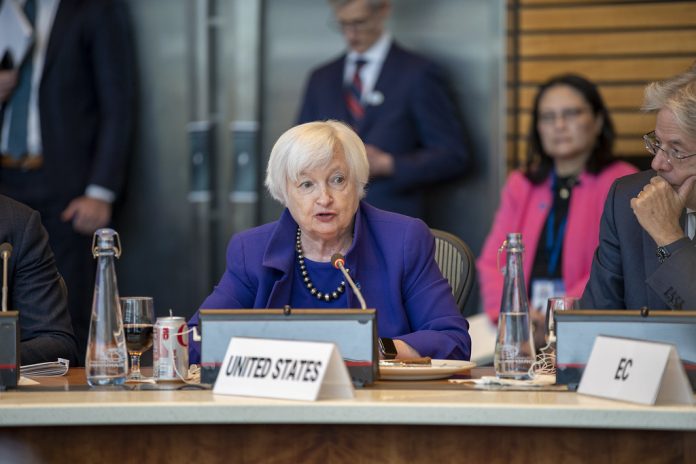By Treasury Secretary Janet Yellen’s definition in 2022, we’re back in a (possibly double-dip) recession. (Opinion)
by E. J. Antoni
Last month, the Department of Commerce released troubling data on the anemic economy, showing that gross domestic income (GDI) shrank in the previous six months. That’s no surprise to half of Americans who believe we’re currently in a recession, but the data refute President Joe Biden’s claim that the economy is “strong as hell.”
And according to Treasury Secretary Janet Yellen’s own words from last year, the economy is back in recession.
There are different ways of measuring the health and size of the economy, like gross domestic product (GDP) and GDI. While GDP measures total production, GDI measures total income. In theory, GDP and GDI should be the same because they measure the two sides of every transaction. In practice, though, there are slight differences in how the data are collected, which leaves some room for interpretation.
In the first half of last year, GDP shrunk for two consecutive quarters—a classic recession indicator—but Treasury Secretary Janet Yellen was quick to dismiss this.
Instead, in August of last year, she cited the average of GDP and GDI—referred to as gross domestic output (GDO)—being positive as an indicator the economy was still growing. But by September, updated figures showed GDO was revised down to a negative level. Yellen and other Biden administration officials remained awkwardly silent about GDO thereafter.
Now, Yellen’s words have come back to haunt her yet again. The latest economic data show the economy might be doing a “double dip,” where a recession is followed by a brief period of growth and then another recession.
But Yellen is no longer espousing GDO as the preferred indicator of economic growth. Following the release of this latest economic data, I reached out to the Department of the Treasury last month, asking if Yellen believed another recession had arrived, given her previous statements. No one had responded by the time of this writing.
But playing Orwellian word games, like redefining “recession,” doesn’t help American families and doesn’t aid in accurately assessing the economy’s current state. Putting politics aside, the data offer a bleak picture of sluggish growth and high inflation brought on by excessive government spending.
In four of the last five quarters, GDO has been negative. This anemic growth is dragging down tax receipts and exacerbating the federal deficit. As interest payments on the debt balloon to levels exceeding major spending categories, like defense, the need for faster economic growth is becoming increasingly apparent.
Economic growth means higher levels of sustained consumption, supporting more people at a higher standard of living. That means more and higher quality products and services—everything from food to health care to housing. But to make the miracle of economic growth happen, government needs to get out of the way.
While some government spending is highly desirable, too much of it necessarily strangles the private economy. And that’s precisely what we’re seeing now, with government accounting for about one-fifth of the economy.
But the art of economics is in measuring opportunity costs, or the value of decisions not taken. Every dollar the government spends must first be taken from the private sector. Whether the government pays for its spending through explicit taxation, or the hidden tax of inflation, or through borrowing, public activity crowds out private activity.
In short, government spending takes away as much or more as it adds to the economy.
Shrinking government means shrinking spending, and the debt-ceiling negotiations were a missed opportunity to accomplish both. But Congress will have another chance to reduce spending this fall when it comes time to pass appropriations bills. The fewer resources government takes from the private sector, the more is available for productive activity that will grow the economy, increase incomes and spur innovation.
While officials in the Biden administration play word games and worry about redefining “recession,” conservatives in Congress should keep their eye on the prize: cutting government spending. That is the only way out of the current economic doldrums, no matter what you call them.
This piece originally appeared in MSN.
Originally published by The Heritage Foundation. Republished with permission.
For more great content from Budget & Tax News.











